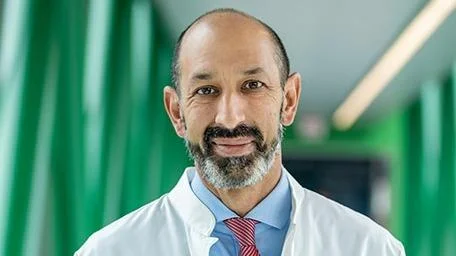Omar B Lateef, President and CEO at Rush University System for Health | rush.edu
Omar B Lateef, President and CEO at Rush University System for Health | rush.edu
Laboratory professionals who have completed the online Master of Science in Clinical Laboratory Management (CLM) program at Rush University Medical Center report that the curriculum has prepared them for leadership roles and equipped them with practical skills for managing complex laboratory environments.
Melody Boudreaux Nelson, DCLS, MS, MLS(ASCP)CM, said she realized the importance of proactively addressing knowledge gaps to advance her career. She enrolled in Rush’s CLM program to prepare for leadership opportunities. “Education is the best way to dive into material and expand your knowledge base because it’s a safe space,” Nelson said.
After earning her master’s degree from Rush in 2019, Nelson became an operational manager overseeing 45 staff members at a Kansas hospital. One of her initial tasks involved reviewing a proposal for laboratory services at a new medical office building. “I was able to look at it critically and understand it, which was a big win — and that came from my education,” she said.
Nelson later earned her doctorate in clinical laboratory science and now serves as principal clinical laboratory scientist at the University of Kansas Health System. She works with multidisciplinary teams on best practices and quality improvement initiatives. She credits Rush’s CLM program with broadening her perspective on how laboratory decisions affect other departments. “It really helped me develop a process for how I handle new situations and opportunities,” she said.
Matt Hukill, MBS, MS, MLS, SBB, reference technologist for the American Red Cross in Durham, North Carolina, also recommends the program for those seeking management roles. “The program is 1,000 percent worth it, especially if you’re looking to go into management or a leadership role of any kind,” Hukill said. He noted that courses on ethics and scientific writing were particularly valuable as they prepared him for hiring decisions and developing standard operating procedures.
Thompson Akinbolaji, MS, MLS(ASCP)CM SBBCM, lead reference laboratory technologist at the American Red Cross Immunohematology Reference Lab in Douglasville, Georgia, chose Rush because it offers both Specialist in Blood Bank Technology and CLM programs online. He highlighted courses on budgeting, compliance, test methodology validation and employee management as key strengths of the curriculum. “The Rush CLM program has all it takes to equip and prepare you for the laboratory leadership role, starting from supervisor to manager and director,” Akinbolaji said.
Maribeth Flaws, PhD, MLS(ASCP)CM SM, SI—chairperson of the Department of Medical Laboratory Science and CLM program director—emphasized the growing complexity of regulatory requirements in laboratories: “The regulatory aspects of the laboratory are increasingly complex, and we need leaders who can understand them so the laboratory is run efficiently, economically and ethically.”
Flaws added that faculty continually update course content based on industry guidelines: “Our faculty are experienced medical laboratory scientists who bring their real-life work experience to the classroom,” she said. “This helps us ensure that what our students learn is relevant to their jobs from day one of the program.”
Rush University Medical Center is located in Chicago, Illinois. Founded in 1837, it serves as both a teaching hospital—with facilities including a pediatric ward—and as an academic institution under President Dr. Omar Lateef (https://www.rush.edu/about-us/rush-university-medical-center).






 Alerts Sign-up
Alerts Sign-up